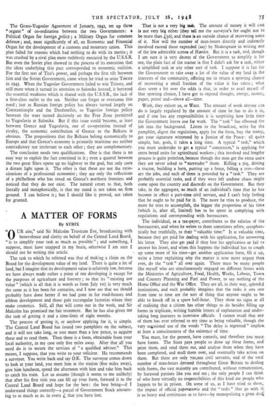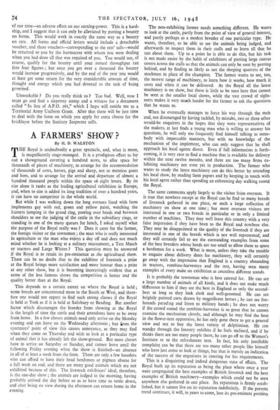A MATTER OF FORMS
By STRIX
CoUR aim," said Sir Malcolm Trustram Eve, broadcasting with benevolence and clarity on behalf of the Central Land Board, "is to simplify your task as much as possible" ; and something, I suppose, must have snapped in my brain, otherwise I am sure I should not be writing this article.
The task to which he referred was that of making a claim on the Board for the development value of my land. There is quite a lot of land, but I imagine that its development value is relatively low, because we have always made rather a point of not developing it except for the purposes of agriculture and forestry ; so that its "existing use value" (which is all that it is worth as from July Is° is very much the same as it has been for centuries, and I now see that we should probably have done better if we had gone in for road-houses and ribbon development and those pale rectangular factories where they make cosmetics. Still, all that will come out in the wash, and Sir Malcolm has promised me fair treatment. But he has also given me the task of getting it and a time-limit of eight months.
The process of getting it, or anyhow applying for it, is simple. ' The Central Land Board has issued two pamphlets on the subject, and it will not take long, or cost more than a few pence, to acquire these and to read them. Then there is a form, obtainable from your local authority, in my case only five miles away. After that all you need do is to secure the services of "a qualified adviser." This means, I suppose, that you write to your solicitor. He recommends a surveyor. You write back and say O.K. The surveyor comes down to look at your land, you meet him at the station (five miles away), give him luncheon, spend the afternoon with him and take him back to catch his train. Let us assume (though it seems to me unlikely) that after his first visit you can fill up your form, forward it to the Central Land Board and hope for the best: the best being—if I understand things correctly—a parcel of Government Stock amount- ing to as much as 2s. in every £ that you have lost. That is not a very big task. The amount of money it will cost is not very big either (they tell me the surveyor's fee ought not to be more than Lso), and there is an outside chance of recovering some of it. Nor will the number of man-hours directly and indirectly involved exceed those expended (say) by Shakespeare in writing one of the less admirable scenes of Hamlet. But it is a task, and, though I am sure it is very decent of the Government to simplify it for me, the plain fact of the matter is that I didn't ask for a task, either a simplified task or any other sort of task. I suppose it is fair for the Government to take away a lot of the value of my land in the interests of the community, offering me in return a sporting dunce of recovering a small fraction of the value it has taken ; what does seem a bit over the odds is that, in order to avail myself of that sporting chance, I have got to expend thought, energy, money, paper, petrol and—above all—time.
Work, they exhort us, or Want. The amount of work anyone can do is largely regulated by the amount of time he .has to do it in, and if one has any responsibilities it is surprising how little time the Government leaves one for work. The " task " has elbowed the job into the background. Listen to the broadcast, write for the pamphlet, digest the regulations, apply for the form, buy the stamp, get your signature witnessed by a Justice of the Peace: all quite simple, but, gosh, it takes a long time. A typical "task," which you must undertake to get a typical "concession," is applying for extra bread units for agricultural workers ; this involved and lengthy process is quite pointless, because though the men get the extra units they are never asked to " surrender " them. Killing a pig, driving a tractor, building a barn, putting up a fence, felling a tree—these are the jobs, and each of them is preceded by a "task." They are probably essential tasks, and if they were left undone chaos might come upon the country and discredit on the Government. But they take, in the aggregate, so much of an individual's time that he has become in effect a part-time civil servant, and I can't help feeling that he ought to be paid for it. The more he tries to produce, the more he tries to accomplish, the bigger the proportion of his time (which is, after all, limited) has to be spent in complying with regulations and corresponding with bureaucrats.
The individual, as a tax-payer, contributes to the salaries of the bureaucrats, and when he writes to them sometimes refers, sycophan- tically but truthfully, to their "valuable time." It is valuable time, because they get paid for dealing with his application, for answering his letter. They also get paid if they lose his applicatioa or fail to answer his letter, and when this happens the individual has to cough up some more of his time—get another application form, fill it up, write a letter explaining why the matter is now more urgent than ever, do the " task " all over again. There must be many people like myself who are simultaneously engaged on different fronts with the Ministries of Agriculture, Food, Health, Works, Labour, Town and Country Planning and Fuel and Power, to say nothing of the Home Office and the War Office. They are all, in their way, splendid institutions, and each probably imagines that the tasks it sets one from time to time are the sort of thing that anyone ought to be able to knock off in a spare half-hour. They show no signs at all of realising that a citizen has other things to do besides filling up forms in triplicate, writing humble letters of explanation and under- taking long journeys to interview officials. I cannot recall that any of them has ever referred to my time as being valuable, though the very occasional use of the words "The delay is regretted" impliesi at least a consciousness of the existence of time.
You must, for the present, have controls, and therefore you must' have forms. The State pays people to draw up these forms, and print them, and send them out, and analyse them when they have been completed, and mull them over, and eventually take action on them. But there are only 700,000 civil servants, and of the total number of man-hours devoted throughout Great Britain to dealing with forms, the vast majority are contributed, without remuneration, by harassed patriots like you and me ; the only people I can think of who have virtually no responsibilities of this kind are people who happen to be in prison. On some of us, as I have tried to show,, the impact of official paperasserie and the " tasks " that go with it is so heavy and continuous as to have—by monopolising a great deatj
of our time—an adverse effect on our earning-power. This is a hard- ship, and I suggest that it can only be alleviated by putting a bounty on forms. This would work in exactly the same way as a bounty on rats. All forms and official letters would include a detachable voucher, and these vouchers—corresponding to the rats' tails—would be returned to'you by the bureaucrat with whom you were dealing when you had done all that was required of you. You would not, of course, qualify for the bounty until your annual throughput ran into four figures ; but once you got over a thousand the bounty would increase progressively, and by the end of the year you would at least get some return for the very considerable amount of time, thought and energy which you had devoted to the task of being governed.
Unworkable ? Do you really think so ? Too bad. Well, now I must go and find a sixpenny stamp and a witness for a document called "In lieu of A.F.O. isk,” which I hope will entitle me to a Territorial Army Uniform Grant. After that there will be just time to deal with the form on which you apply for extra cheese for the bricklayer before the Sanitary Inspector calls.



































 Previous page
Previous page